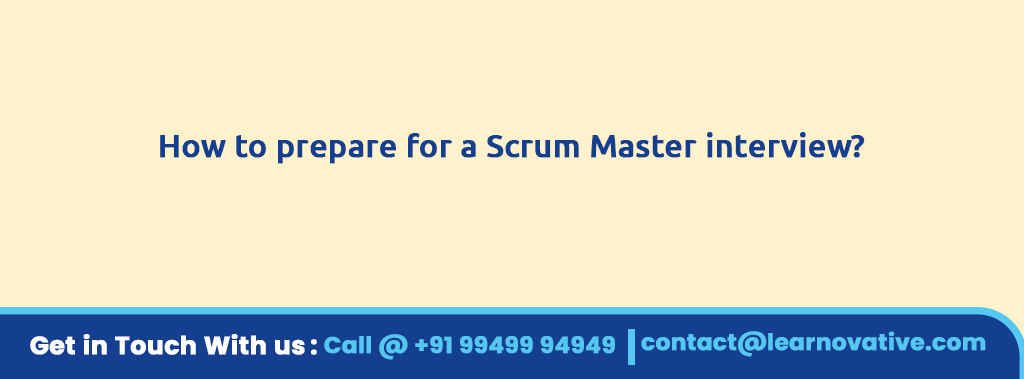
Preparing for a Scrum Master interview involves a combination of understanding Agile and Scrum values & principles, demonstrating practical experience, and showcasing your soft skills. Here’s a guide to help you prepare well for your Scrum Master interview:
1. Agile Values and Principles:
- Agile Mindset: Emphasize your commitment to the agile mindset and continuous improvement.
- Agile Manifesto: Familiarize yourself with the Agile Manifesto and its 4 values and 12 principles. You also have to know the history behind Agile Manifesto. You can read the details at: agilemanifesto.org
2. Understand Scrum framework elements:
- Definition of Scrum and its origins. Get familiar with the creators of Scrum Guide (Jeff Sutherland and Ken Schwaber)
- Understand how Scrum Framework is aligned with the Agile Manifesto Values and Principles
- Details of Scrum Guide versions along with the latest Scrum guide version.
- Scrum Values: Familiarize yourself with the five Scrum values: commitment, courage, focus, openness, and respect.
- Scrum Artifacts: Product Backlog, Sprint Backlog, Increment.
- Scrum Team: Product Owner, Scrum Master, Developers.
- Scrum Events: Sprint, Sprint Planning, Daily Scrum, Sprint Review, Sprint Retrospective.
- Scrum Guide: Read and understand the Scrum Guide thoroughly as it is the definitive source for Scrum.
- Comparison of latest Scrum Guide and one version before the latest version.
- Definition of Done
3. Know Your Role:
- Scrum Master Responsibilities: Understand the specific responsibilities of a Scrum Master, including facilitating events, removing impediments, and coaching the team.
- Understand how a Scrum Master can help in a Multi Team Scrum Product development
- Servant Leadership: Familiarize yourself with the concept of servant leadership, as it’s a key aspect of the Scrum Master role.
4. Practical Experience:
- Real-world Examples: Be prepared to share specific examples from your previous roles where you successfully applied Scrum principles and practices.
- Challenges and Solutions: Discuss any challenges you faced in your Scrum Master role and how you addressed them.
5. Who does what in Scrum:
- Get familiar with who does what in Scrum Team including Sprint progress tracking (Developers), Overall tracking (Product Owner) and the respective tools such as Burnup, Burndown or Cumulative Flow diagrams
- Also understand the role of Scrum Master in terms of teaching these tools to the Developers and Product Owner
- Similarly understand the ownership and management of the Scrum Artifacts including Sprint Backlog is created, managed and owned by Developers and Product Backlog is created, owned and managed by the Product Owner.
6. Soft Skills:
- Communication Skills: Highlight your communication skills, as a Scrum Master needs to facilitate communication within the team and with stakeholders.
- Conflict Resolution: Be ready to discuss how you handle conflicts within the team and promote a positive team culture.
- Empathy: Showcase your ability to understand and empathize with team members.
7. Scrum Tools:
- Jira, Trello, VersionOne, or any other Agile Project/Product management Tools: Be familiar with popular Scrum tools and how they are used in real-world scenarios. You may expect questions such as how do you create a Product Backlog in JIRA or how do you create a User Story in JIRA or how do you start a Sprint in JIRA etc. So you have to get familiar with using the tools from at least one end to end Product release point of view.
8. Questions to Expect:
- Typical Scrum Master Interview Questions: Be prepared for questions about your experience with Scrum in a single team, multi team, handling conflicts, and facilitating Scrum events.
9. Stay Updated:
- Industry Trends: Be aware of current trends and advancements in Agile and Scrum methodologies. Also get some insights of how Scrum is used in out side Software industry.
10. Certifications:
- Certifications: Consider getting certified as a Scrum Master (e.g., Scrum Alliance’s Certified ScrumMaster). While not mandatory, it can enhance your credibility.
11. Mock Interviews:
- Practice: Conduct mock interviews with a friend or mentor to simulate the interview environment. Learnovative provides 150+ hand picked interview questions and answers for Scrum Master interviews. You can check them in the “Resources” section of www.learnovative.com website
12. Feedback and Learning:
- Learn from Feedback: If you receive feedback from practice interviews, use it as a learning opportunity to improve your responses. Also, collect all the questions you have faced in previous interviews and check for the appropriate answers for those questions so that in the next interview you can do better.
13. Questions to Ask:
- Prepare Questions: Have thoughtful questions ready for the interviewer about the team, company culture, and their approach to Scrum.
14. Continuous Improvement:
- Express Your Commitment: Highlight your commitment to continuous improvement and your willingness to adapt to new challenges.
Important Tips:
- Do some research about the company and their products etc details
- Be punctual and on time for the interview
- Maintain eye contact and a confident voice pitch in the interview
- Your answer should be precise and concise
- Understand the context behind the question before jumping to answer
- If you do not understand the question you can ask to repeat or rephrase
- You can think for few seconds to frame your response in an effective way
- Do not try to bluff, if you do not know you just admit it but show your interest to learn
- Assess the interviewer body language and accordingly check if you have answered the question to his/her satisfaction or rephrase your answer
Remember to tailor your responses to showcase your unique experiences and how they align with the principles of Scrum. Good luck with your next Scrum Master interview!
Learnovative provides a high quality and impactful Scrum Master Training with hands-on activities, case studies, real time scenarios to understand Scrum and Agile well. If you are interested to know more about CSM workshop, or Scrum Master certification, you can check the “Blog” section of https://www.learnovative.com/blog/

